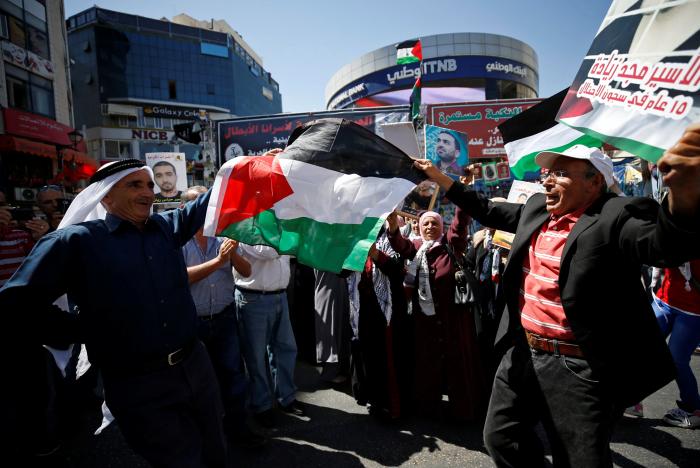Ramallah – Issa Qaraqe, the head of the Palestinian Committee of Prisoners’ Affairs, said 80 percent of demands put forth by Palestinian prisoners who had went on a mass hunger strike have been accomplished.
Most of those requests involved family visitation and living conditions within jail walls. Palestinian prisoners had fought for their demands by leading a 41-day hunger strike, a fight which ended by reaching a deal between prison management and the prisoners.
“A radical transformation was achieved through this strike, in terms of human and living conditions for prisoners, which is a step forward in the fight to protect their human rights,” said Qaraqe.
The hunger strike is a way of “bringing prisoners closer to their basic rights and demands and preventing the occupation from harming the dignity of the Palestinian prisoners,” he said in a statement.
Israeli authorities conceded to one of the prisoners’ main demands — that they should have two family visits a month instead of the one they were entitled to before the strike
As soon as the strike was ended, the administration of the Israel Prison Service (IPS) stated that the suspended second monthly family visitation had been reinstated — but clarified that the cancellation of the second visit was originally a decision of the Red Cross and not Israel.
Qaraqe gave no clear details on the deal brokered– however confirmed ending the mass strike of some 1,300 Palestinians.
The Prisoners’ Affairs Committee said that among the improvements encompassed by the deal was better access to phones.
More so, banned visitation of over 100 families was lifted allowing more than 140 children to visit their parents.
Midpoint solutions on second-degree relatives’ visitation rights were also negotiated.
Food quality, temperature regulation and the transfer of prisoners to facilities closer to the residence of families were also argued by the deal, winning significant improvements for prisoners.
Palestinians hailed the deal as a victory for the hunger strikers after Israeli authorities repeatedly vowed not to negotiate with prisoners.
The IPS gave a number of guarantees to meet a number of demands, but refused to meet other demands and said it was ready to discuss some of the remaining demands after the strike was halted, Palestinian sources told Asharq Al-Awsat.
Approximately one million Palestinians have been apprehended by Israeli authorities since in 1948 and the subsequent occupation of the West Bank, East Jerusalem, and the Gaza Strip in 1967, according to a joint statement released on Saturday by Palestinian organizations.
